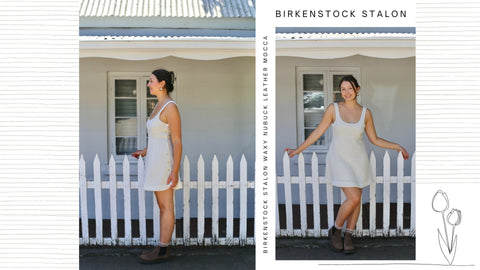Whether it be finding your dream pair of jeans, a nice top for a special occasion or simply some everyday basics at affordable prices (plus in a way that benefits communities and the environment) there is no doubt there are many perks to op shopping. A lot of Op Shops are run by charities and not-for-profit organisations that give back to communities. Choosing to purchase these pre loved items helps, assists and supports those in need or those living in poverty. In addition to this, it helps combat landfill and promotes environmental responsibility.
The Impact of Fast Fashion
The harmful trend of fast fashion and constantly purchasing “on trend” items impacts our environment immensely. The cheaper and easily accessible garments arrive in stores faster than consumers can keep up. As the quality of these items is often poorer, it results in us buying more and discarding of more. An alarming fact revealed on ABC’s War on Waste disclosed that a whopping 6,000kg (six tonnes) of fashion waste is generated every 10 minutes in Australia. The importance of having these op shops to divert tonnes of waste into landfill is vital. The more society thinks about sustainability purchasing and styling, the more it can impact the demand and the way clothing is produced.
Extending the Lifespan of Goods
Extending the lifespan of ones goods will assist in waste reduction and can have a have a hugely positive impact on our planet and the way consumers shop within retail. Birkenstock are well known for their sustainable practices and take environmental responsibilities into consideration in many areas of the brand. The responsible use of natural resources and compliance with stringent social and environmental standards are two of Birkenstocks core values. Below are some environmental practices implemented by the brand and us at Birkenstock in the Hills.
Don’t replace, repair!
Choosing to repair your Birkenstocks and taking a stand against throwaway society can be a much more sustainable and eco-friendly option. Some of the most common and needed Birkenstock repairs are a sole replacement, cork repair, hard heel tab and recycle. The Birkenstock workshop in Australia has saved over 100,000 pairs from landfill since 1992. Each repair differs in cost depending on what you choose to repair or how much you are repairing. If you are unsure about what repair is needed for your Birkenstocks, we suggest bringing them into your nearest Birkenstock Store for an assessment by staff or alternatively, drop them to your nearest store so they can be sent to the Birkenstock Workshop for an assessment and quote. Please note that some Birkenstocks cannot be repaired if they have been extremely worn. There is a point where only a recycle or a new pair is the only available option.
Sustainable Materials in Birkenstock Footwear
The materials used in the creation of Birkenstock footwear comes from sustainable sources such as cork, natural latex, jute and leather. One of the most important raw materials is cork. Cork is a natural and sustainable product that is reproduced and therefore, can be harvested over and over again without harming the tree. The cork is taken from the bark layer of the Cork Oak. Roughly five centimetres of thick bark is stripped from the Cork Oak and this can only be done every 7-9 years. One tree can provide 100-200kg of cork during its life.
Eco-Friendly Production Process
Birkenstock was one of the first shoe manufacturers to use water-soluble and solvent free adhesives almost exclusively in the production process. Furthermore, the natural latex used as the primary binding agent is obtained from the resin of rubber trees. The process surrounding this does not occur for the first time until the tree has matured to 6 years old. From then on, a rubber tree provides roughly 80 grams of latex each day for 25 years. This material has much better energy balance than synthetic latex and is free from pollutants such as solvents or CFCs.
Jute is an additional material used in the manufacturing process which is a renewable resource. The bushes grow from 15-20cm before they are then harvested after about four months.
Sustainable Practices at Birkenstock in the Hills
Below are just a few examples of additional sustainable and environmentally friendly practices that we follow at Birkenstock in the Hills:
- We use biodegradable packaging boxes that are 100% plastic free and are made from recycled materials. These boxes can be reused up to four times.
- Majority of our cleaning products are plant based and environmentally friendly. We prefer not to use chemicals where possible.
- Birkenstock in the Hills also choose to use 100% renewable power in the shop.
- We are always trying to reduce extra wrapping and printing wherever possible. We have different bins for different wastes and always recycle whenever possible.
The little thrill one gets when finding a pre loved treasure is such a fantastic feeling. Bailey is an avid op shopper who loves to find gems to style with her growing Birkenstock collection. She shares her thoughts below:
“I choose to op shop for many reasons! The most important reason for me is that it is the most sustainable way to stay stylish. I love giving old clothes a new life. Another reason why I stick to shopping second-hand, is that you will never find someone wearing the same item of clothing as you. For me, being unique in my style is very important! Buying second-hand also helps me save my pennies (which allows me to spend more money on my Birkies).”
The Impact of Sustainable Shopping
Choosing to op shop and pair it with environmentally friendly brands such as Birkenstock can make a positive impact on our planet, the future and social choices. As with Bailey, it can also provide you the opportunity to be creative and embrace individually as well as show care and respect for our environment.









